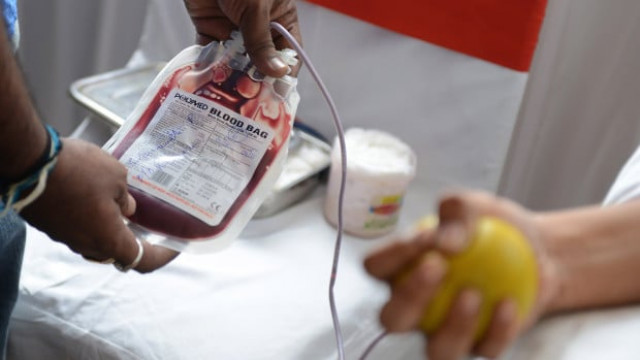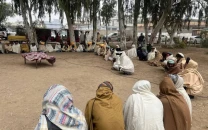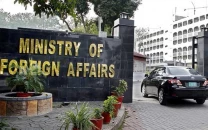88% blood deposits in Islamabad come from family, friends, says IBTA report
WHO recommends every blood donation should be voluntary, anonymous and non-remunerated

88% blood deposits come from family, friends, says IBTA report. PHOTO: AFP
The World Health Organisation (WHO) recommends that all countries should be self-sufficient in all blood products and that every blood donation should be voluntary, anonymous and non- remunerated.
Facebook brings blood donation feature
But the Islamabad Blood Transfusion Authority (IBTA) 2017 data reveals that the main reliance continues to be on the patients' friends and relatives, the "Family Replacement Donors”.
This is despite the fact that Islamabad has the highest literacy rate in the country and also possibly the most sensitised populace.
One of the main contributing factors for the shortage of voluntary blood donors is the lack of a proper donor friendly environment in blood centres. The situation in Islamabad Capital Territory (ICT) regarding the source of blood supply is similar to the rest of the country.
According to IBTA Annual Report 2017, about 68,149 blood donations were collected in ICT in 2017 from 21 blood banks, and of them 88.4 per cent (60,229) donations were collected from family replacement donors while only 11.6 per cent (7,920) donations were collected from voluntary donors, most of them one time donors.
The study reveals that the rate of voluntary blood donations in 2017 was reduced instead of increasing as 16 per cent voluntary blood donations in 2016 reduced to around 12 per cent in 2017.
On the one hand there was a shortage of blood donations but on the other thousands of blood components were discarded due to lack of coordination between the blood banks operating in the ICT.
The study calculated that out of collected blood of 68,149, a total of 7,170 blood components were discarded.
Out of total the discard, 2,234 blood units were discarded due to infections of Hepatitis B, C, HIV/AIDS and such. At least 3,621 blood components were discarded due to expiry date, and 1,315 due to other miscellaneous causes. About 50% blood components were discarded due to expiry of their shelf life, mostly in smaller centres while the larger blood banks had chronic shortages.
In some hospitals where blood component therapy is not rationally practiced, the blood components with very short shelf life (platelet concentrates) expire and have to be discarded.
It has also been observed that the prevalence of hepatitis B and C is quite significant among the blood donors who are otherwise apparently healthy and normal. A proportion of blood collected has thus to be discarded.
Blood banks not a business, stress panelists
The data also reflects an uneven distribution of the burden of work as 61 per cent (41,044) of the blood donations were collected by the two largest blood banks that is Pakistan Institute of Medical Sciences (Pims) and Shifa International Hospital (SIH). Pims collected around 42 per cent while SIH 19 per cent donations.
The contribution of the remaining 17 licensed blood banks was only 25% (n= 17,535). Out of these 17 blood banks, 10 centres collected less than 1,000 donations per year.
In other words, most of the blood banks functioning in the federal capital do not justify their existence as they do not have sufficient workload, the report says. These blood banks need to be converted into hospital based blood banks relying on the larger blood establishments for their donations etc.
Female donations very rare
In 2017, out of the total blood donations collected in ICT, 67,081 (98.4%) were from men and only 1,066 (1.6%) were donated by women.
Low female donation rates in an educated region like the federal capital is a source of concern, it notes. It is believed that lack of female friendly facilities, poor privacy, misconceptions, poor nutritional status, cultural and social factors contribute to low female donation rates. However, the response in mobile camps in female educational centres is encouraging, it says.
100% rate of voluntary blood donation ideal
Voluntary blood donation rate should be 100 percent so that relatives of patients in need of blood in emergencies should not be compelled to give blood to their dear ones, said Prof. Hasan Abbas Zaheer, Chairman IBTA. Family replacement donors may carry risk factors which they would not like to reveal and also humanly it is not appropriate to ask the family members to arrange blood when they are already under stress and strain, he added.
“In developed countries the rate of voluntary blood donation is 100 percent. Even our neighboring countries like Iran and Sri Lanka have excellent voluntary blood donation system”.
Iran has 100% rate of voluntary blood donations, he said, but in Pakistan it is quite low putting the entire burden on the poor patients to arrange everything on their own.
However, he was of the view that people in Pakistan are very much willing to donate blood and wait to receive calls for donation in emergencies without realizing that if they donate in routine and regularly all the routine and emergency needs of the patients will be covered from such donations.
Published in The Express Tribune, August 28th, 2018.



















COMMENTS
Comments are moderated and generally will be posted if they are on-topic and not abusive.
For more information, please see our Comments FAQ